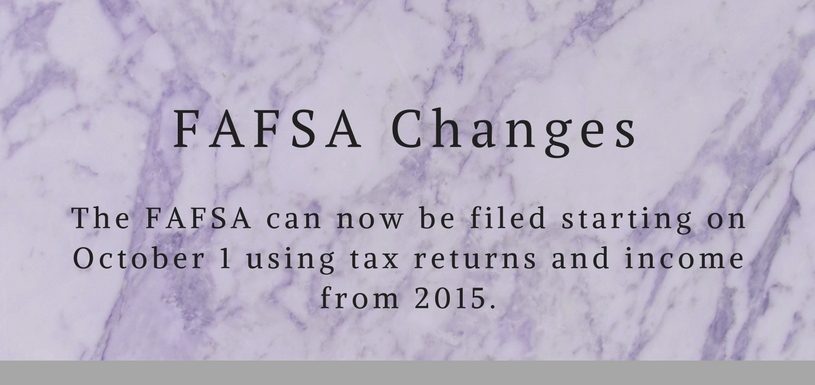New changes are coming to the Free Application for Student Aid (FASFA) in 2016 for the 2017-2018 school year. The FAFSA is moving the date students can first apply for financial aid, which allows students to use more accurate income and tax information.
Instead of Jan. 1, reports can be filed as soon as Oct. 1. This allows students and universities to begin filing for financial aid as early as possible. It also allows families to collect all of their financial information and gives students the chance to receive their reward sooner, providing time to think about the important college decision and if it is the right fit.
These shifts will have little to no effect on current students receiving their rewards any faster, however.
The earlier date to file reports allows for the use of more accurate and official financial reports, as families can now use the previous year’s tax information and income.
While most families did not change financially between 2015 and 2016, some families have had a drastic financial change. FASFA takes this into consideration.
If students’ financial incomes differ immensely from the past year, FASFA requests that they contact their school’s financial aid office after filing their report, and they can assess and modify the financial aid the students receive.
With the use of correct financial information, instead of estimations, the financial reward will be much more accurate and compatible to a student’s specific needs.
In regards to changes in financial aid at Capital, Susan Kannenwischer, director of financial aid, said, “These two shifts will, in no way, limit financial aid.”
Kannenwischer later said that these changes were only meant to encourage more to apply and receive higher financial awards.
A few challenges also come along with the changes to the FAFSA, however.
“One significant challenge, though, is that the Department of Education and the state of Ohio are keeping their timelines the same as they provide grant amounts to colleges,” Kannenwischer said.
Since they are not the same time-wise, it does not produce faster results, and the reward information will be subject to change.
The earlier date has more of an effect on seniors in high school than on current college students.
Usually, when filing their report, students have a general idea of where they are going to school by January. In October, most students do not know where they would like to go, and are probably still going on college tours and researching.
While filling out the FASFA, it is encouraged that seniors include all of the colleges think they would go. Even before being accepted into any college, it is important to add it to the list.
Current students seem to have no argument against the new changes.
Sarah Quasny, a first-year education major, says it is a lot more work and it would take a lot more time than before. Yet she believes this will provide more accurate information in regard to financial aid help.
With these new changes, it will allow more time to think about the decision, along with giving more precise awards for students.

